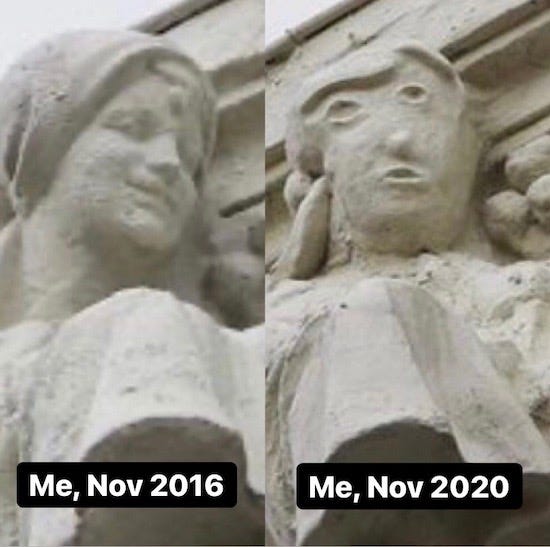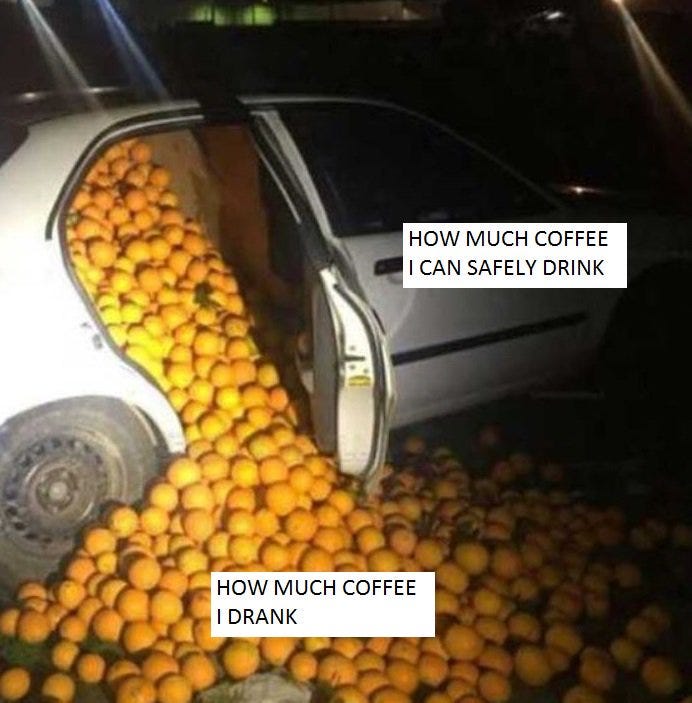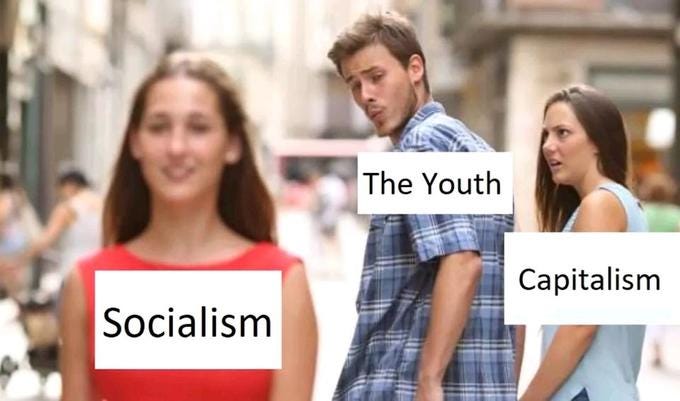Memes Are Comics, And We're Living Through a Golden Age
And there's a decent chance that you, yes you, have done some cartooning
Hey, there,
So, the thing about golden ages is that they’re usually only obvious in retrospect. People rarely know when they’re actually living though one. In fact, we’re doing exactly that right now. As you read this, we are living through an unheralded populist golden age of comics. One where the cultural presence of comics as an art form has never been greater, with them playing an almost dominant role in our online communication; one where a previously-unimaginable percentage of the population is engaged with them, even (to a surprising degree) in creating them. No, I’m not talking about Marvel movies or Riverdale, or even comics dominating the YA market. I’m talking about memes.
Because make no mistake: memes are comics. And all of us who spend time online making and trading memes on social media channels are participants in the golden age. Welcome to the club, and thank you for your contributions, whatever form they might happen to take.
Pardon me if I just made your monocle pop out and fly across the room. But the truth is inarguable. Memes are comics! Let me walk you through it.
Just to make sure we’re all talking about the same thing here, let’s take a second and discuss memes (in the modern sense, that is; the word “meme” actually has an older, more varied, definition as a discrete bit of self-propagating information, but that usage has fallen out of wide usage). You know them, right? The dominant form of communication on Twitter, Facebook, and (to a slightly lesser extent) Instagram? A JPG or PNG (or sometimes an animated GIF) including an image and some text that plays off of it? The distracted boyfriend looking away from his girlfriend, with labels spelling out a metaphor? Kermit the Frog sipping tea and looking smug? The fighting dudes who throw a chair?
For the past half-decade, memes have felt increasingly like the dominant form of online communication. Especially in our current dual states of extreme political polarization and neverending, despaired hunger for a laugh, it’s hard to spend more than five minutes on any social media site without seeing snarky memes arguing for or against some political position. In the past 12 hours, I’ve bounced into memes telling me about the 2020 election, the dumbness of the Roman aristocracy, how hard it is to get a Playstation 5, how awesome really fat cats are (true), how clueless cis men are (also true, I suppose), and how QAnon is about to save the US from Satan. People of all political persuasions (and all types of sense of humor) employ memes to get their point across; remember all the racist Pepe the Frog stuff from 2016? As far as that goes, memes are recognized as such potent political weapons that Mother Jones reported about well-funded efforts to train right-wing meme-makers for the 2020 election cycle.
In all cases, political, social, and existential, the memes serve as a ubiquitous conversational shortcut. Memes are powerful for getting points across because for some reason our brains seem really receptive to the combination of images and short, pithy bits of text. And if you spend much time in the comics world, this probably sounds familiar; the power of combining images and text is often brought up when we talk about the draw of comics. And of course it sounds familiar, since we’re ultimately talking about the same thing.
The boundaries of what exactly are and are not comics can be tough to nail down, since at first blush these boundaries seem to cry out for Supreme Court Justice Potter Stewart’s “I know it when I see it” definition, which is as useless as it is memorable. But we can try to suss things out. As with all theoretical matters in comics, Scott McCloud offers a good place to start, at least. McCloud, in 1993’s Understanding Comics, settles on “juxtaposed pictorial and other images in deliberate sequence, intended to convey information and/or to produce an aesthetic response in the viewer” as his operational definition for comics; his phrasing is awkward in a (futile) attempt to lay own precise boundaries and account for special cases.
Scott McCloud is a very smart man who has done invaluable work on the theoretical end of comics. But here he has fallen into a logical trap. In his reasoning, McCloud argues that for something to qualify as comics, it needs to have multiple panels or images (“juxtaposed … images in … sequence”) to fall within the boundaries. To this I ask: how is it, then, that Dennis the Menace is a work of comics on Sundays, when it is a multipanel strip, but not comics the rest of the week, when it’s a single-panel work featuring the same characters, same situations, and created by the same people? This distinction is absurd.
Conclusion: single-panel comics are still comics (I’d argue that a sequential nature is granted by the implication that things happen before and after the single panel), and the main thing we need to look for are images words working together. And what do you know, most memes are single images with words, working together. Memes are comics.
Anyway, multipanel memes also exist! Consider the ever-popular American Chopper Argument meme format, a pure example of multipanel storytelling with images and dialogue. Memes are comics!
I can, of course, hear another counterargument taking shape: that even if all of the above arguments are true, memes are almost always based on photography, while within comics the images are always drawings. This is an interesting argument, one that can be rebutted with a single word: fumetti.
While it’s true that most American comics have been based on drawings, in Europe comics based on photography are so well-established that they have their own name. No one disputes that fumetti are comics. By that light, there’s no room to dispute that memes are, either.
And anyway, some extremely popular meme formats rely on drawings, rather than photography. Memes are comics.
Memes are images with text, generally with an implied narrative. Comics are images with text, generally with an implied narrative. They’re the same thing. I think the point is proven. But then think of the wild implications. First, if memes’ ability to make a point in a short, memorable, and effective way makes them one of the dominant (and steadily growing!) forms of online communication, that means that fundamentally much of the internet is speaking to each other with comics. And that’s amazing! Historically, comics have had other periods of social dominance, but it took very different forms and functioned in a top-down manner. Everyone might have been nuts about Superman in 1941, or about Peanuts in 1968, but in both cases they were reading works published and disseminated from a central source; nobody (well, almost nobody; there’s always somebody) was trying to change minds and prove political points by swapping Superman comics.
This is a far cry from the current state, where memes are zinged around directly at the person-to-person level without the controlling bottleneck of a publisher or a syndicate at the top. In the previous model, person-to-person comics culture consisted of talking to people about how great Snoopy’s novel sounds, or which member of Batman’s rogues gallery is best, with relatively little of the actual discourse taking the form of comics itself; now, we fling memes directly at each other to argue that we need gun control right now or that only a naïve idiot would believe that gun control is possible.
Of course, it gets even crazier if you step back and look at where all of these memes are coming from: everyone involved is making them. Not only are we all conversing in comics to a degree never seen before, we’re also all creators. Thanks to the ubiquity of online meme generators, photoshop, and MS Paint, everyone with something to say is a cartoonist now (or at least a comics creator; I can definitely see an argument that “cartoonist” as a term needs to be defined narrowly to someone who originates the art rather than remixing found art with new text. This theoretical stuff is awfully vague and fuzzy out here on the frontier). Not only that, but the unsourced, unattributed nature of memes manages to even kill the idea of the creator as an important role. Memes are anonymously made and shared; we’re all the creator, and we’re all the audience.
Comics as an art form has always had a gatekeeping problem; through the 20th century, comics creation was almost completely locked up within large, corporate entities that controlled what got printed and distributed. Alternative and independent comics sprung up as ways to get around the traditional gatekeepers, but even they operated on a one-to-many model where a single creator was getting work out to a variety of end readers. The internet promised to change the nature of all types of communication and level all the playing fields, but the 2000s webcomic boom really just looked like the previous alternative/indie scene with lower barriers to entry for creators. But the rise of memes-as-comics really has brought the level democraticization of comics that we were promised, in a way we never could have dreamed.
So the next time you pop open MS Paint to put together a dank-ass meme to lay a burn on some clown on Twitter, take a second to pat yourself on the back. You’re a cartoonist, or something really similar to a cartoonist, taking part in a revolutionary golden age and helping to drag an art form into strange new places no one ever imagined existed. Good job, you!
Right on. Stay safe.
LINKS / RECS / ETC
I’m extremely late to the party on this, but: Beastie Boys Story, the documentary currently up on AppleTV (and MAN do I not like that it’s a single-platform thing, but that’s a complaint for another time and place), is great, great stuff. If you’re even vaguely interested in them, or ever danced around to any song of their, I think it’s worth your while. It’s a filmed event where Mike D and Ad-Rock walk through the band’s story, falling back on a lot of great media clips and, more than anything, talking about what a great, inspirational spirit Adam Yauch was. It’s funny—wittiness was always the not-so-secret undergirding power of the Beastie Boys—but it’s also heartening to see three young men with a lot of societal incentives to be shitheads just kind of wake up and say we don’t have to be like this and will themselves to become better people. There’s also a story intertwined in there about the empty rapacity of the record industry and the extremely unlikely but great way the Beasties managed to climb out of a couple of holes there, too.
The book Adam Horovitz and Mike Diamond released last year is also great; it covers a lot of the same territory as the documentary, but the two things diverge in different directions and tell their stories in such different ways to make them both worthwhile even if you’ve seen or read the other.
CLOSING STUFF
OK, so here at the bottom, sorry for the ragged copy editing; my deal with myself was to keep this fast and loose, which is gonna mean typos. On the other hand, that also means it’ll actually come out, instead of being obsessed over.
If you have any thoughts/reactions/what have you about this, I’d love to hear about it, either by email or on Twitter. And if you know anybody who might dig this, please forward it on to them, or send ‘em the signup link! And thanks!








